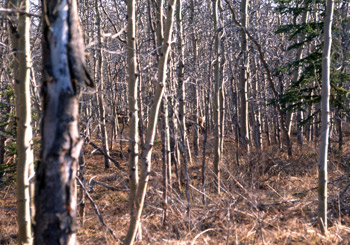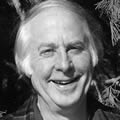|

From time to time we come across key information that we think will be of interest to you, or we produce summaries of current information. Check back often for updates.
************************************
June 11, 2009: Ecosystem-based Conservation Planning: Definition, Principles and Process defines the basics for ecosystem-based conservation planning. The boreal version provides examples from the boreal forest, while the montane-temperate version provides examples from temperate forests.
Toronto Panel Event, April 29, 2009: Boreal Forests For the Future - Maintaining Whole Systems On Earth’s Crown
Ontario and Canada's spectacular Boreal forests are at a crossroads. Unsustainable forestry, other industrial activities, and a lack of proper monitoring have stressed it to its limits:
Woodland caribou are on the verge of extinction; significant intact forests are being lost; communities are collapsing.
A new approach to conserving and managing this globally important forest is urgently needed. This new approach combines scientific knowledge, Indigenous knowledge, and intuition to maintain and restore ecosystems—the home systems—that sustain all life.
These important topics were addressed at a panel discussion sponsored by the Silva Forest Foundation and held in Toronto on April 29, 2009. Speakers at the Toronto event were:
 Herb Hammond is a forest ecologist, pioneer of ecosystem-based conservation planning and author of the award-winning book, Seeing the Forest Among the Trees. His new book is Maintaining Whole Systems on Earth's Crown: Ecosystem-based Planning for the Boreal Forest. See Herb's power point presentation. Herb Hammond is a forest ecologist, pioneer of ecosystem-based conservation planning and author of the award-winning book, Seeing the Forest Among the Trees. His new book is Maintaining Whole Systems on Earth's Crown: Ecosystem-based Planning for the Boreal Forest. See Herb's power point presentation.
 Professor Deb McGregor, Anishinabe, is from the Whitefish River First Nation is currently Assistant Professor in Geography and Aboriginal Studies at the University of Toronto. Deb has provided an article she wrote in 2006 that gives her views of the aboriginal perspective. See Deb's paper here. Professor Deb McGregor, Anishinabe, is from the Whitefish River First Nation is currently Assistant Professor in Geography and Aboriginal Studies at the University of Toronto. Deb has provided an article she wrote in 2006 that gives her views of the aboriginal perspective. See Deb's paper here.

Professor Jeremy Kerr is a Professor of Biology at University of Ottawa and is a member of the Science Panel of the International Boreal Conservation Campaign. See Jeremy's power point presentation.
 Professor James Schaefer is Professor of Biology at Trent University in Peterborough, Ontario. See Jim's power point presentation. Professor James Schaefer is Professor of Biology at Trent University in Peterborough, Ontario. See Jim's power point presentation.
 Dr. Sean C. Thomas has a PhD from Harvard University in Organismic and Evolutionary Biology, and has been at the University of Toronto since 1999. His research focuses on tree and forest ecosystem responses to forest management, environment changes, and their interaction. He is currently appointed as a Senior Canada Research Chair in Forests and Environmental Change. See Sean's power point presentation. Dr. Sean C. Thomas has a PhD from Harvard University in Organismic and Evolutionary Biology, and has been at the University of Toronto since 1999. His research focuses on tree and forest ecosystem responses to forest management, environment changes, and their interaction. He is currently appointed as a Senior Canada Research Chair in Forests and Environmental Change. See Sean's power point presentation.
**************************************
The Power of Community - Ecosystem-based Conservation Planning Across Canada
In summer 2003, the Silva Forest Foundation convened a Community Summit of representatives from the communities where we have completed ecosystem-based conservation plans. Summit participants shared their stories and learned from each other. You can read their powerful and inspiring stories in our booklet The Power of Community. You can order a print copy here.
**************************************
Introduction to Appreciative Inquiry
Appreciative Inquiry is a way of working with groups to define a future grounded in the best of what has happened in the past. It is a powerful tool that focuses on the positive and creates tremendous energy within a group. Read more about Appreciative Inquiry.
**************************************
IMPORTANT WEB SITE RESOURCES
The Appreciative Inquiry Commons provides case studies, theory, and a wealth of information about the practice of appreciative inquiry, which focuses on what is working in an organization, rather than trying to fix what is wrong.
The Society for Conservation Biology publishes a scientific journal and also provides information about the latest science and practice of conservation biology.
The International Society for Ecological Economics publishes a scientific journal of topics relating to economies that thrive within the boundaries of ecosystems.
The Society for Ecological Restoration publishes a scientific journal that identifies ways that damaged ecosystems can be restored.
Global Footprint identifies how our actions impact the planet and describes actions we can take to minimize our footprint.
|

